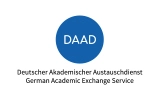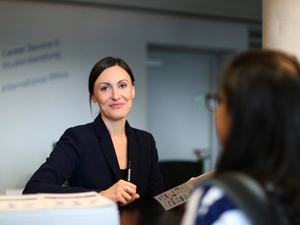Programme Overview
Erasmuscode of THI
D INGOLST01
What is Erasmus?
Erasmus+ is the EU's programme to support education, training, youth and sport in Europe. The 2021-2027 programme places a strong focus on social inclusion, the green and digital transitions, and promoting young people’s participation in democratic life.
It supports priorities and activities set out in the European Education Area, Digital Education Action Plan and the European Skills Agenda. The programme also
- supports the European Pillar of Social Rights
- implements the EU Youth Strategy 2019-2027
- develops the European dimension in sport.
Key Actions
Key Action 1: Learning Mobility of Individuals
Key Action 2: Cooperation among organisations and institutions
Key action 3: Support to policy development and cooperation
The Programme has the following specific objectives:
- to promote learning mobility of individuals and groups, as well as cooperation, quality, inclusion and equity, excellence, creativity and innovation at the level of organisations and policies in the field of education and training;
- to promote non-formal and informal learning mobility and active participation among young people, as well as cooperation, quality, inclusion, creativity and innovation at the level of organisations and policies in the field of youth;
- to promote learning mobility of sport staff, as well as cooperation, quality, inclusion, creativity and innovation at the level of sport organisations and sport policies.
Funding
Funding SM ( study/ internship abroad)
Financial support for Erasmus+ student stays is based on the different costs of living in the destination countries ("Programme Countries").
The funding rates for student mobility for study purposes (SMS) and work placements abroad (SMP) are based on country groups I to III. Further information can be found under Outgoing student mobility.
Funding ST (staff- and lecture mobility)
The financial support for Erasmus mobilities for teaching purposes (STA) or for further education and training (STT) is based on the different costs of living in the destination countries ("programme countries").
For Germany, fixed daily rates apply for stays in the three country groups up to the 14th day of the stay; from the 15th to the 60th day of the stay, the funding amounts to 70% of the stated daily rates. Further information can be found under Staff mobility.
The topic of sustainability in the Erasmus+ programme is based on two dimensions:
- the environmental footprint of the programme
- the programme's contribution to societal change towards a sustainable world
These dimensions will be addressed in the 2021-2027 programme generation through the following priorities:
- Green mobility
- Raising awareness of the issues of sustainability, the environment and climate change
- Cooperation projects on 'green' topics
- Utilisation of the instruments of digital transformation
The European Commission and the NA DAAD want to significantly increase the participation of previously less represented groups in the Erasmus+ programme by 2027. With concrete measures, we are making a significant contribution to more equal opportunities in higher education.
New opportunities for stays abroad
Expansion of financial support for participants
To ensure greater equality of opportunity, we have significantly expanded the target groups of participants with fewer opportunities to receive additional lump-sum top-up amounts and real cost funding in consultation with the BMBF. The following groups of people receive additional financial support:
- Students from a non-academic family background
- Working students
- Students and university staff with a child/children
- Students and university staff with a disability or chronic illness
Further information on the funding rates can be found in the Kriterienkatalog for additional financial support (top-up amounts and real costs) for participants with fewer opportunities for the KA131/ KA171 projects in the 2022, 2023 and 2024 calls.
Flexible mobility formats at a glance
To increase participation, the Erasmus+ programme offers students the opportunity to undertake short physical stays in the host country combined with virtual formats in their home country as part of a blended mobility. As part of Blended-Intensive-Programmes (BIPs), universities can offer teachers and learners new and creative opportunities for international educational cooperation in jointly designed online and face-to-face courses.
Erasmus+ aims to promote equal opportunities and inclusion, which is why access to the programme is facilitated for learners from disadvantaged backgrounds (e.g. for participants who are single parents while studying abroad) and with special needs.
Further information on additional financial support for participants with fewer opportunities can be found on the Homepage of DAAD.
Learning Mobility of Individuals
Mobility with Programme Countries (KA131) offers German universities the opportunity to fund students, teaching staff and university staff for study and internship stays in one of the 33 participating programme countries. Here you will find an overview of the funding opportunities.
The following mobility measures are funded under the EU education programme Erasmus+:
- Studies Abroad for students (SMS)
- Traineeships abroad for students (SMP)
- Staff Mobility for Academics (STA)
- Staff Mobility for Training (STT)

Deutscher Akademischer Austauschdienst (DAAD)
Nationale Agentur für EU-Hochschulzusammenarbeit
Kennedyallee
5053115 Bonn
- Tel.: +49(0)228/882-8877
- E-Mail: erasmus@daad.de
- Homepage: www.eu.daad.de
- Logo: www.daad.de/portrait/presse/logos/08959.de.html
ECHE/EPS/Erasmus+ Student Charter
Erasmus Charta for Higher Education (ECHE)





![[Translate to English:] Logo Akkreditierungsrat: Systemakkreditiert](/fileadmin/_processed_/2/8/csm_AR-Siegel_Systemakkreditierung_bc4ea3377d.webp)








![[Translate to English:] Logo IHK Ausbildungsbetrieb 2023](/fileadmin/_processed_/6/0/csm_IHK_Ausbildungsbetrieb_digital_2023_6850f47537.webp)


